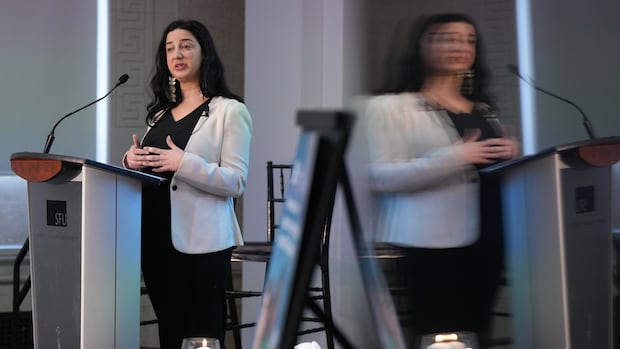British ColumbiaBritish Columbia’s Human Rights Commissioner says the province is worsening the toxic drug crisis by treating substance use as “moral failings” or a criminal problem, and says the approach is a violation of people’s rights.Framing drug use as an issue of public safety obscures true problem, commissioner saysCBC News · Posted: Nov 14, 2025 9:10 PM EST | Last Updated: 3 hours agoListen to this articleEstimated 4 minutesThe audio version of this article is generated by text-to-speech, a technology based on artificial intelligence. B.C. Human Rights Commissioner Kasari Govender, seen here in March 2023, said that stigma against drug users is driving harmful policies that are causing deaths. (Darryl Dyck/The Canadian Press)British Columbia’s Human Rights Commissioner says the province is worsening the toxic drug crisis by treating substance use as “moral failings” or a criminal problem, calling the approach a violation of people’s rights.Kasari Govender released a position statement Thursday urging the province to “put politics aside” and respond to the emergency with the urgency it demands. More than 16,000 people have died from toxic drugs since the province declared a public health emergency in 2016.“When we see the number of deaths and how dangerous this crisis really is, we see the toxic drug supply now as the leading cause of death for people between 19 and 59 in this province,” Govender said in an interview with Radio-Canada.“We actually should be providing people with appropriate treatments and with access to a drug supply that isn’t going to kill them.”The statement from Govender’s office cites the increasingly toxic unregulated drug supply, often containing fentanyl, benzodiazepines and other unpredictable substances, as the primary driver of deaths. “And yet we don’t see the requisite level of response to that. We don’t see the kind of urgency that we saw, for example, with the COVID crisis,” the commissioner said.WATCH | Province changes safer-supply drug program:B.C. ends practice of take-home safer supply drugsB.C. Health Minister Josie Osborne announced that people who rely on prescription opioids must now take those safer supply drugs under the supervision of a pharmacist. It comes after revelations the drugs were being diverted into the hands of organized criminals. As Katie DeRosa reports, critics say the move is long overdue.Govender said the province should refocus on expanding safer supply and harm-reduction programs due to evidence presented by health professionals — including B.C.’s provincial health officer and former chief coroner Lisa Lapointe.In February, Lapointe said she was disappointed by the province’s overhaul of its safer-supply program for illicit drugs.The province moved to a “witnessed-only” model, in which people are supervised while consuming their prescription drugs and aren’t allowed to take them home, with Lapointe saying the approach appears to ignore scientific evidence.Former B.C. chief coroner Lisa Lapointe has said she was disappointed by the province’s decision to limit its safer supply program so people can no longer take their prescribed opioids home with them. (CBC News)Govender says public debate has increasingly framed the crisis as a question of disorder or criminal justice — but that lens obscures the real safety issue.“It is indeed an issue of safety, but maybe not quite in the way that we’re thinking about it,” she said. “It’s the safety of the thousands and thousands of people that have died or have serious brain injuries or other injuries as a result of this toxic drug crisis.”Her report says treating people who use drugs as if their health issues are moral failings is a human-rights violation. She argues that B.C.’s shift toward more involuntary care and criminal-justice approaches is driven largely by stigma, not evidence.For instance, in April last year, the province recriminalized the use of drugs in public places radically altering a pilot program aimed at addressing the toxic drug crisis.“It’s in this criminalized model of drug prohibition that this toxic drug crisis arose,” she said. “That model isn’t working.”She said the province should favour safer supply and harm reduction, arguing they reduce deaths and serious harm although they “might not be politically popular”.“A compassionate approach requires embracing scientific evidence over political ideology and making every possible effort to save lives,” the human rights commissioner said.WATCH | Former health officer weighs in on decriminalization:Focus on homelessness, not drug decriminalization, former health officer saysPeople who want B.C. to end its drug decriminalization pilot should instead be focusing on the root causes of homelessness, says former provincial health officer Dr. Perry Kendall, who declared the public health emergency over toxic, illicit drugs in 2016.A spokesperson for B.C.’s Health Ministry says that it is expanding harm reduction services like overdose prevention, take home naloxone and prescribed alternatives to street drugs — along with more treatment services.They also pointed to an ongoing expansion of involuntary care for those with concurrent drug addiction and severe mental health issues.”Our government respects individual rights but also has a responsibility to ensure that people who are vulnerable and not able to make decisions about their own care, receive the care they need,” the spokesperson said.“There are safeguards built into the Mental Health Act for individuals involuntarily admitted under the Act such as the right to ask for a second medical opinion, the right to apply for a hearing with the Review Panel or they can ask to speak to an Independent Rights Advisor.”With files from Radio-Canada’s Rosanna Tiranti and The Canadian Press
B.C. human rights commissioner says stigma is driving province’s ‘harmful’ drug policies











